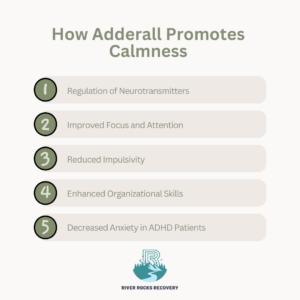Adderall is one of the most common drugs given to people with Attention Deficit Hyperactivity Disorder (ADHD). Its stimulant effects work by raising dopamine and norepinephrine levels in the brain. While Adderall is typically used to promote focus and attention, its effects can vary greatly, resulting in seemingly paradoxical outcomes such as hyperactivity and relaxation.
At River Rocks Recovery, we recognize the complexities of stimulant medications like Adderall, especially for individuals navigating recovery from substance use disorders. In this blog, we’ll explore how Adderall affects energy and mood, and why it can have such varied impacts.
How Does Adderall Work in Your Brain?
Before learning about its dual effects, it is crucial to understand how it works in your brain. Adderall is made up of amphetamine salts that activate the central nervous system. It helps persons with ADHD enhance concentration, reduce impulsive behavior, and regulate attention span by increasing neurotransmitters such as dopamine and norepinephrine levels.
The effects, however, are dependent on several circumstances, including dosage, individual brain chemistry, and the presence of any coexisting disorders.
Key Mechanisms:
- Dopamine Regulation: Dopamine is known as the “feel-good” neurotransmitter, and Adderall increases its levels. For those with ADHD, this effect helps normalize dopamine activity, leading to better focus and emotional regulation. For those without ADHD, however, too much dopamine can lead to overstimulation and hyperactivity.
- Norepinephrine Activation: Norepinephrine helps control the body’s “fight or flight” response. Adderall boosts norepinephrine levels, increasing alertness and physical energy, which can either enhance focus or cause jitteriness, depending on the individual.
The Contradictory Nature of Calmness
One of the primary reasons Adderall can create serenity in ADHD patients is the way it affects their brain. While it is a stimulant, it works differently in people with ADHD than in people without the disorder. ADHD brains usually have lower dopamine levels, which contributes to distractibility and hyperactivity. Adderall restores brain equilibrium by boosting dopamine, resulting in enhanced focus, impulse control, and, in many cases, a sense of calm.
For persons with ADHD, Adderall can feel like a mental “slowing down.” Tasks become more doable, and the continual mental chatter that is frequently associated with ADHD may decrease, producing a sense of calm even while a stimulant is in use.
Hyperactivity- A Major Side Effect of Adderall!
However, some people report hyperactivity or restlessness when using Adderall, especially if the dosage is too high or the medication is taken incorrectly. This is more likely in people who do not have ADHD or whose brains do not require the additional stimulation provided by Adderall.
Stimulants can also cause hyperactivity in the cardiovascular system. Adderall raises heart rate and blood pressure, which can cause some users to feel jittery or overly energized. For those who are sensitive to stimulants, even a tiny amount can cause hyperactivity, anxiety, or insomnia.
Common Effects of Hyperactivity from Adderall:
- Restlessness and Jitteriness: Overstimulation from elevated dopamine and norepinephrine levels can lead to a sense of unease, restlessness, and difficulty relaxing.
- Anxiety and Panic Attacks: When taken in large doses or misused, Adderall can trigger heightened anxiety or panic, especially in individuals predisposed to mental health issues.
- Insomnia and Sleep Disruption: Adderall’s stimulating effects can interfere with sleep patterns, making it hard to fall asleep or stay asleep, leading to sleep deprivation and subsequent mental and physical exhaustion.
- Cardiovascular Stress: Adderall increases heart rate and blood pressure, which can be dangerous, especially for individuals with pre-existing cardiovascular conditions. Prolonged misuse increases the risk of heart attack, stroke, and other cardiovascular events.
- Addiction and Dependency: Since Adderall enhances dopamine production, misusing it can lead to a cycle of dependence, where users feel they need the drug to feel energized or focused.
Factors Affecting the Dual Effects
- Each brain reacts to Adderall differently. People with ADHD frequently report a soothing effect, however, people without ADHD or with certain mental health disorders may exhibit increased hyperactivity.
- Too much Adderall can cause overstimulation, resulting in hyperactivity, irritation, or anxiety. Too little may not provide the intended relaxing effect.
- Over time, people may build a tolerance to Adderall, diminishing its effectiveness. Misuse, such as taking higher doses than prescribed, can also exacerbate hyperactivity or cause other side effects such as anxiety, heart palpitations, or sleeplessness.
- If an individual has another disorder, such as depression, the effects of Adderall may be more complex.
How to Strike a Balance?
Individuals taking Adderall to control ADHD symptoms should consult with a healthcare specialist to determine the appropriate dosage and balance. The goal is to achieve a state of calm and concentration while avoiding unpleasant side effects such as hyperactivity and anxiousness. In some circumstances, modifying the dosage, changing the time of day the medicine is taken, or looking into other treatments can assist manage Adderall’s calming and hyperactive effects.
Calmness: Adderall’s Effect on ADHD
While Adderall is known as a stimulant, its calming effects on individuals with ADHD are well-documented. For those with ADHD, Adderall helps improve focus and impulse control, allowing them to feel more organized and in control of their thoughts and actions.

How Adderall Promotes Calmness
Regulation of Neurotransmitters
Adderall works by increasing the levels of dopamine and norepinephrine in the brain. Dopamine plays a crucial role in mood regulation, motivation, and attention, while norepinephrine is involved in arousal and alertness. For individuals with ADHD, these neurotransmitters are often imbalanced. By restoring this balance, Adderall helps create a more stable mood, reducing the overwhelming feelings of anxiety and agitation that can accompany untreated ADHD. This regulation is essential for those seeking treatment at an Addiction Treatment Center Ohio, as it helps in addressing co-occurring disorders effectively.
Improved Focus and Attention
One of the primary benefits of Adderall is its ability to enhance concentration. For individuals with ADHD, distractions can easily derail their focus, leading to frustration and anxiety. Adderall helps them maintain attention on tasks, which not only promotes a sense of accomplishment but also fosters a calmer mindset as they can complete tasks without being overwhelmed by distractions. This improved focus is particularly beneficial in Addiction Treatment Programs, where maintaining attention can enhance the recovery process.
Reduced Impulsivity
Impulsivity is a hallmark symptom of ADHD that can lead to chaotic and unpredictable behavior. Adderall helps individuals think before they act, allowing for more considered decision-making. This reduction in impulsive behaviors contributes to a sense of control and calmness, as individuals are less likely to engage in risky or hasty actions that could lead to stress or anxiety. This is crucial for clients in an Alcohol Rehab Treatment Program, as impulsivity can hinder their recovery journey.
Enhanced Organizational Skills
Many individuals with ADHD struggle with organization and time management, leading to feelings of being overwhelmed. Adderall can improve executive functioning skills, enabling individuals to better plan, organize, and prioritize their tasks. This structured approach not only helps them stay on top of responsibilities but also reduces the chaos that can lead to stress, fostering a more serene environment. In Drug Rehab Treatment Programs, effective organization is key to achieving personal goals.
Decreased Anxiety in ADHD Patients
Anxiety is a common comorbidity for individuals with ADHD. The inability to focus can create a cycle of anxiety and frustration. Adderall helps alleviate this anxiety by enhancing concentration and reducing the stress associated with disorganization and impulsivity. As individuals gain better control over their thoughts and actions, they often experience a significant reduction in anxiety levels. This calming effect is particularly beneficial in Opiate Rehab Treatment Programs, where managing anxiety is crucial for successful recovery.
Promotion of Structure and Routine
Adderall encourages individuals to establish daily routines. A consistent schedule can be comforting and reassuring, creating predictability in their lives. This structure fosters a sense of calm as individuals know what to expect throughout their day, helping them feel more grounded and less anxious. In Partial Hospitalization Programs, routine is often emphasized to help patients develop healthy habits.
Better Sleep Patterns
For some individuals, ADHD can disrupt sleep patterns, leading to restlessness and fatigue during the day. When used as prescribed, Adderall can help improve overall sleep quality by promoting better sleep hygiene and encouraging healthier sleep habits. A well-rested mind is better equipped to handle stressors calmly. Sleep is a vital component in the recovery process offered in Intensive Outpatient Programs.
Positive Behavioral Changes
As individuals experience improvements in focus, organization, and emotional regulation, they may also notice enhancements in their relationships. Improved social interactions and the ability to manage emotional responses can lead to a more peaceful state of mind. As conflicts and misunderstandings decrease, individuals often report feeling calmer and more at ease in their interactions with others. This positive behavioral change is essential in the context of Outpatient Treatment Programs, where interpersonal relationships play a crucial role in recovery.
Risks of Adderall Misuse in Recovery
At River Rocks Recovery, we emphasize the importance of using medications like Adderall responsibly, especially for individuals in addiction recovery. The misuse of Adderall, even when prescribed, can lead to significant health risks and complicate the recovery process.
Potential Risks:
- Heightened Risk of Relapse: For individuals recovering from substance use disorders, misusing stimulants like Adderall can act as a trigger, increasing cravings for other substances.
- Mental Health Strain: Misusing Adderall can exacerbate mental health conditions like anxiety, depression, and mood swings, making recovery even more challenging.
- Physical Dependence: Over time, misusing Adderall can lead to physical dependence, where users feel unable to function normally without it. This can make breaking the cycle of addiction even harder.
Looking for the Best Addiction Treatment Center to Create Balance? Call River Rocks Recovery!
River Rocks Recovery offers customized addiction treatment programs to help you restore control and balance in your life. Our compassionate team provides evidence-based therapies, personalized recovery programs, and ongoing support to ensure you get the care you need on your path to long-term sobriety.
Whether you are dealing with substance abuse or co-occurring disorders, we are here to help you every step of the way. Contact River Rocks Recovery today to take the first step toward a more balanced, healthier future!
Conclusion
Adderall’s dual effects of hyperactivity and calmness illustrate how complex this medication is, especially when misused. Whether it promotes calmness or triggers hyperactivity depends on the individual, the dosage, and the presence of ADHD. Misusing Adderall comes with serious risks, especially for those in recovery from addiction. If you or someone you know is misusing Adderall or struggling with stimulant addiction, River Rocks Recovery is here to help. Our addiction treatment programs in Ohio provide the comprehensive care and support necessary to help individuals overcome their struggles and build a healthier, more balanced life. Experience the full spectrum of care at River Rocks Recovery. Reach out to us today at (888) 905-6281 for support on your journey to recovery.
FAQ on Dual Effects of Adderall
Why does Adderall calm people with ADHD but cause hyperactivity in others?
Adderall helps regulate dopamine and norepinephrine levels, which can calm hyperactivity in individuals with ADHD. In people without ADHD, or when misused, it can lead to overstimulation and hyperactivity due to increased dopamine levels.
What are the risks of Adderall misuse?
Misusing Adderall can cause restlessness, anxiety, insomnia, cardiovascular issues, and even addiction. Misuse is particularly risky for individuals in recovery, as it can heighten cravings and increase the risk of relapse.
Can Adderall be addictive?
Yes, Adderall can be addictive, especially when taken in larger doses or without a prescription. It increases dopamine levels, leading to a potential cycle of dependence.
How can River Rocks Recovery help with Adderall addiction?
River Rocks Recovery offers comprehensive addiction treatment programs, including drug rehab, partial hospitalization, and intensive outpatient care. Our personalized treatment plans address both Adderall misuse and co-occurring mental health conditions.




























